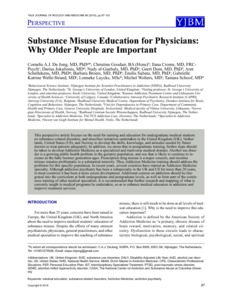De Jong, CAJ;
Goodair, C;
Crome, I;
Jokubonis, D;
El-Guebaly, N;
Dom, G;
Schellekens, A;
Broers, B;
Subata, E;
Welle-Strand, GK;
et al.
De Jong, CAJ; Goodair, C; Crome, I; Jokubonis, D; El-Guebaly, N; Dom, G; Schellekens, A; Broers, B; Subata, E; Welle-Strand, GK; Luycks, L; Wolters, M; Schoof, T
(2016)
Substance Misuse Education for Physicians: Why Older People are Important.
Yale J Biol Med, 89 (1).
pp. 97-103.
ISSN 1551-4056
SGUL Authors: Goodair, Christine M
![[img]](https://openaccess.sgul.ac.uk/107783/8.hassmallThumbnailVersion/yjbm_89_1_97.pdf)  Preview |
|
PDF
Published Version
Available under License ["licenses_description_publisher" not defined].
Download (215kB)
| Preview
|
Abstract
This perspective article focuses on the need for training and education for undergraduate medical students on substance-related disorders, and describes initiatives undertaken in the United Kingdom (UK), Netherlands, United States (US), and Norway to develop the skills, knowledge, and attitudes needed by future doctors to treat patients adequately. In addition, we stress that in postgraduate training, further steps should be taken to develop Addiction Medicine as a specialized and transverse medical domain. Alcohol use disorder is a growing public health problem in the geriatric population, and one that is likely to continue to increase as the baby boomer generation ages. Prescription drug misuse is a major concern, and nicotine misuse remains problematic in a substantial minority. Thus, Addiction Medicine training should address the problems for this specific population. In recent years, several countries have started an Addiction Medicine specialty. Although addiction psychiatry has been a subspecialty in the UK and US for more than 20 years, in most countries it has been a more recent development. Additional courses on addiction should be integrated into the curriculum at both undergraduate and postgraduate levels, as well as form part of the continuous training of other medical specialists. It is recommended that further research and mapping of what is currently taught in medical programs be undertaken, so as to enhance medical education in addiction and improve treatment services.
| Item Type: |
Article
|
| Additional Information: |
Open access. For further information, please see: https://medicine.yale.edu/yjbm/about/openaccess/ |
| Keywords: |
Addiction Medicine, addiction psychiatry, medical education, substance-related disorders, Behavior, Addictive, Education, Medical, Undergraduate, Humans, Netherlands, Substance-Related Disorders, United Kingdom, United States, Humans, Substance-Related Disorders, Behavior, Addictive, Education, Medical, Undergraduate, United States, Netherlands, United Kingdom, Gastroenterology & Hepatology |
| SGUL Research Institute / Research Centre: |
Academic Structure > Population Health Research Institute (INPH) |
| Journal or Publication Title: |
Yale J Biol Med |
| ISSN: |
1551-4056 |
| Language: |
eng |
| Publisher License: |
Publisher's own licence |
| PubMed ID: |
27505022 |
| Dates: |
| Date |
Event |
| 2016-03-24 |
Published |
|
 |
Go to PubMed abstract |
| URI: |
https://openaccess.sgul.ac.uk/id/eprint/107783 |
Statistics
Item downloaded times since 16 Mar 2020.
Actions (login required)
 |
Edit Item |



